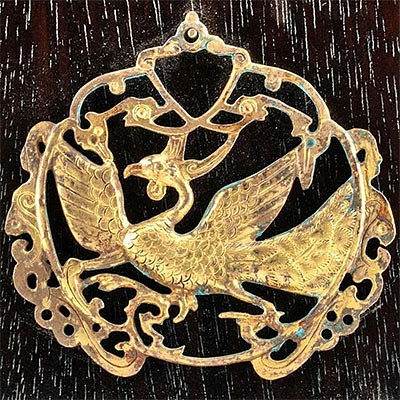19th C. Russian Icon in Kiot - Christ Pantocrator
Lot 122
About Seller
Artemis Gallery
686 S Taylor Ave, Ste 106
Louisville, CO 80027
United States
Selling antiquities, ancient and ethnographic art online since 1993, Artemis Gallery specializes in Classical Antiquities (Egyptian, Greek, Roman, Near Eastern), Asian, Pre-Columbian, African / Tribal / Oceanographic art. Our extensive inventory includes pottery, stone, metal, wood, glass and textil...Read more
Estimate:
$1,500 - $2,000
Absentee vs Live bid
Two ways to bid:
- Leave a max absentee bid and the platform will bid on your behalf up to your maximum bid during the live auction.
- Bid live during the auction and your bids will be submitted real-time to the auctioneer.
Bid Increments
| Price | Bid Increment |
|---|---|
| $0 | $25 |
| $300 | $50 |
| $1,000 | $100 |
| $2,000 | $250 |
| $5,000 | $500 |
| $10,000 | $1,000 |
| $20,000 | $2,500 |
| $50,000 | $5,000 |
| $100,000 | $10,000 |
| $200,000 | $20,000 |
About Auction
By Artemis Gallery
Dec 10, 2020
Set Reminder
2020-12-10 12:00:00
2020-12-10 12:00:00
America/New_York
Bidsquare
Bidsquare : All That Glitters | Ancient & Ethnographic
https://www.bidsquare.com/auctions/artemis-gallery/all-that-glitters-ancient-ethnographic-6192
Think glass, silver, gold, bronze, brass, wearable, decorative, worth owning! Unique finds from Egypt, Greece, Italy, the Near East. Asian art from east to west. Pre-Columbian. Spanish Colonial. Fabulous Russian Icons with silver oklads. Ancient / Ethnographic jewelry, and more! Artemis Gallery info@artemisgallery.com
Think glass, silver, gold, bronze, brass, wearable, decorative, worth owning! Unique finds from Egypt, Greece, Italy, the Near East. Asian art from east to west. Pre-Columbian. Spanish Colonial. Fabulous Russian Icons with silver oklads. Ancient / Ethnographic jewelry, and more! Artemis Gallery info@artemisgallery.com
- Lot Description
Eastern Europe, Russia, ca. 19th century CE. Finely painted in egg tempera, gold leaf, and gesso on wood, an icon of Christ Pantokrator (also Pantocrator), Lord of the Universe, holding an open holy Gospel in his left hand, the fingers of his right hand giving benediction, arranged to form the initials of Christ’s monogram, IC XC. Embellishing the image is a glorious gold leaf halo and stunning Russian strapwork background and borders presenting mesmerizing abstract geometric patterns, also delineated in gold leaf. The icon is set in a decorative wood kiot of a fanciful shape with a gilded liner. Size: 10" W x 13.5" H (25.4 cm x 34.3 cm)
The wood kiot is a case that protects the icon from smoke and dust as well as temperature and humidity variations to some extent; however, it also serves to enhance and add ornament to the icon. Though this example is missing its glass front, its decorative shape and gilded liner still bestows the icon with glorious splendor.
The most accepted translation of Pantocrator is "Almighty" or "All Powerful" and the visage of Jesus certainly projects his omnipotence. This iconic depiction continues to be a central icon of the Eastern Orthodox Church. Christ gazes beyond the confines of the image, his visage finely delineated with graceful brushstrokes, a rendering aspiring to the naturalism sought in classical antiquity and the Renaissance, this in contrast to the expertly carved elaborate surround.
Icons were some of the first religious artworks brought to Russia from Byzantium. These sacred pictures reached a high point in the Byzantine era; however, the Russians brought their own style to the art of the icon. Icons were initially created for use in churches and processions. In time they became smaller and were used increasingly within households. To this day they remain an important form of visual culture in Russia's orthodox religious community. Icons (icon means "image" in Greek) are sacred objects within the Eastern Orthodox Christian tradition. These painted images depict holy persons and saints as well as illustrate scenes from the Scriptures. Icons are not worshiped, but are instead venerated for their ability to focus the power of an individual's prayer to God. As such they are truly "windows into heaven."
Provenance: private Francis & Lilly Robicsek Collection, Charlotte, North Carolina, USA, acquired second half of the 20th century
All items legal to buy/sell under U.S. Statute covering cultural patrimony Code 2600, CHAPTER 14, and are guaranteed to be as described or your money back.
A Certificate of Authenticity will accompany all winning bids.
We ship worldwide and handle all shipping in-house for your convenience.
#119514With proper restoration, this piece would be quite a standout in any collection. Areas of craquelure to the painted image, especially over the Gospel. Surface wear with scratches and losses to painted and gilded surfaces. Gilded liner shows fissures, losses, and areas of touch up. Kiot has cracks and losses as shown.Condition
- Shipping Info
-
All shipping is handled in-house for your convenience. Your invoice from Artemis Gallery will include shipping calculation instructions. If in doubt, please inquire BEFORE bidding for estimated shipping costs for individual items.
-
- Buyer's Premium



 EUR
EUR CAD
CAD AUD
AUD GBP
GBP MXN
MXN HKD
HKD CNY
CNY MYR
MYR SEK
SEK SGD
SGD CHF
CHF THB
THB


















